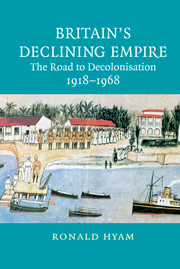Book contents
- Frontmatter
- Contents
- List of illustrations
- Maps
- Preface
- List of abbreviations
- Introduction
- 1 ‘The whole world is rocking’: British governments and a dysfunctional imperial system, 1918–1945
- 2 ‘British imperialism is dead’: the Attlee government and the end of empire, 1945–1951
- 3 ‘Rugged and tangled difficulties’: the Churchill and Eden governments and the end of empire, 1951–1956
- 4 ‘The wind of change is blowing’: the Macmillan and Douglas-Home governments and the end of empire,1957–1964
- 5 'We could no longer afford to honour our pledges': the Wilson government and the end of empire, 1964–1968
- Epilogue
- Appendix
- Select bibliography
- Index
3 - ‘Rugged and tangled difficulties’: the Churchill and Eden governments and the end of empire, 1951–1956
Published online by Cambridge University Press: 05 June 2014
- Frontmatter
- Contents
- List of illustrations
- Maps
- Preface
- List of abbreviations
- Introduction
- 1 ‘The whole world is rocking’: British governments and a dysfunctional imperial system, 1918–1945
- 2 ‘British imperialism is dead’: the Attlee government and the end of empire, 1945–1951
- 3 ‘Rugged and tangled difficulties’: the Churchill and Eden governments and the end of empire, 1951–1956
- 4 ‘The wind of change is blowing’: the Macmillan and Douglas-Home governments and the end of empire,1957–1964
- 5 'We could no longer afford to honour our pledges': the Wilson government and the end of empire, 1964–1968
- Epilogue
- Appendix
- Select bibliography
- Index
Summary
A paradox confronts us. Although replete with major incident – the suppression of revolt in Malaya, Kenya, and Cyprus, suspension of the constitution in British Guiana, deportations of a Greek Cypriot archbishop and the kabaka of Buganda, self-government for the Sudan and Gold Coast, withdrawal from the Suez Canal Zone and Simon's Town naval base, and the climacteric disaster of the Suez Crisis – the Conservative governments led by Churchill and Eden have usually been seen as a period of quiescence in colonial policy-making, and frequently criticized for failure to grapple with issues of international decline. Churchill was seventy-seven years old and in uncertain health, his grip on business patchy. He abolished a number of useful cabinet committees, and wanted everything analysed on a single sheet of paper; his administration produced no major surveys of imperial problems. One historian has described his government as ‘a farce of sometimes tragic dimensions’ followed by the ‘fatal errors’ of Eden's. The dominant historical paradigm for colonial policy in these years is ’keeping change within bounds‘; taking his cue from Goldsworthy's well-known phrase, L. J. Butler speaks of ‘limiting change where this was feasible, rather than actively promoting it’. Holland, too, discerns ’a mounting desire to try to rein in political advancement’, with too much policy conducted in ‘this surly spirit’.
- Type
- Chapter
- Information
- Britain's Declining EmpireThe Road to Decolonisation, 1918–1968, pp. 168 - 240Publisher: Cambridge University PressPrint publication year: 2007



